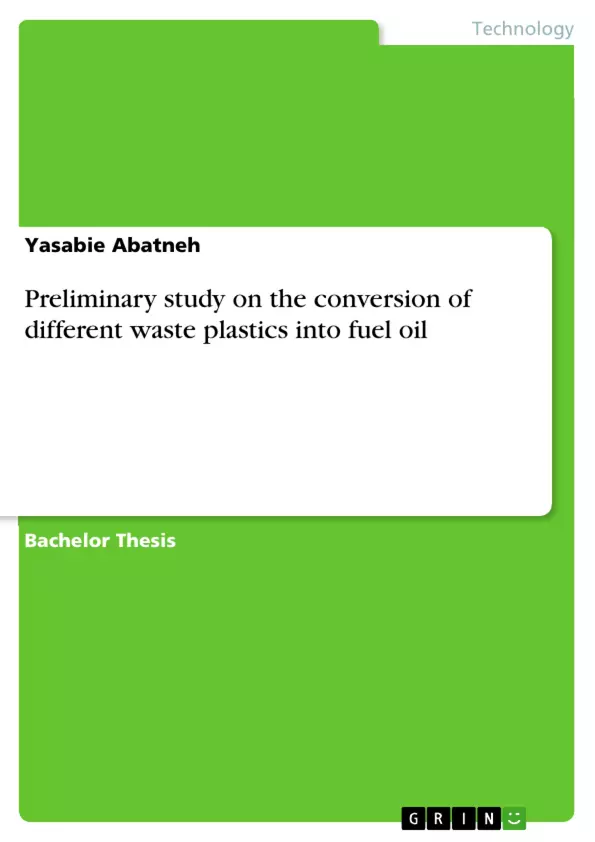Abstract: The objective of the work is the conversion of waste plastics into fuel oil. Plastic wastes such as, polypropylene, low density polyethylene, high density polyethylene, polystyrene are the most frequently used in everyday activities and disposed of to the environment after service. Plastic are those substances which can take long periods of time to decompose if disposed off simply to the environment. Therefore, waste plastic should be changed into usable resources. The different waste plastics were thermally cracked at different temperature and then it was tried to measure the oil produced, the residue left after the reaction is completed, and the gas produced. Then it is compared that which types of plastics can yield higher amount of oil. There are a number of methods by which plastic wastes can be managed such as incineration, recycling, land filling, and thermal cracking. But this work focuses on thermal cracking of waste plastic to change them into usable resources, because in this method the emission of hazardous gases to the environment insignificant. This means we can change all the waste in to useful resources.
Keywords: liquid oil, thermal cracking, and waste management system
Table of Contents
- Acknowledgement
- List of figures
- List of tables
- Abstract
- Abbreviations
- Overview
- 1. Introduction.
- 1.1 Background
- 1.2 Property of HDPE and LDPE.
- 1.3 Sources and properties of plastic wastes.
- 2. Literature review
- 2.1 Social and environmental impact of waste plastic
- 2.2 Plastic Waste management system....
- 2.2.1 Recycling....
- 2.2.2 Land filling.
- 2.2.3 Incineration...
- 2.2.4 Thermal cracking as a waste management option.
- 2.3 Liquid Fuel Production..
- 2.3.1 Thermal and catalytic recycling of waste plastic into crude oil.
- 2.3.2 Thermal cracking..
- 2.3.3 Catalytic cracking..
- 2.4 Effect of major Operating Conditions.
- 2.5 Statement of the problem.
- 2.6 Objective
- 3. Methodology
- 3.1 Materials and chemicals needed...
- 3.2 Experimental set up and description ..
- 3.3 Experiments..........\n
- 4. Result and discussion
- 4.1 Effect of temperature on the yield of crude oil from LDPE.
- 4.2 Effect of temperature on crude oil from HDPE
- 4.3 Effect of temperature on crude oil from polystyrene
- 5. Product characterization.
- 5.1 Determination of density.
- 5.2 Determination of viscosity.
- 5.3 Determination of flash point.………………………..\n
- 6 Conclusion and Recommendation.....
- References
Objectives and Key Themes
This thesis aims to investigate the production of crude oil from waste plastics through thermal cracking. The research focuses on evaluating the effects of temperature on the yield and quality of crude oil produced from different types of plastics, namely LDPE, HDPE, and polystyrene.
- The environmental impact of plastic waste and the need for sustainable waste management solutions.
- The potential of thermal cracking as a method for converting plastic waste into valuable products.
- The influence of temperature on the yield and quality of crude oil produced from different types of plastics.
- The characterization and analysis of the produced crude oil to determine its potential for use as fuel.
Chapter Summaries
- Chapter 1 provides an introduction to the research, outlining the background of plastic waste management, the properties of HDPE and LDPE, and the sources and properties of plastic wastes. It highlights the significance of finding sustainable solutions to plastic waste problems.
- Chapter 2 reviews existing literature related to the social and environmental impact of plastic waste, different plastic waste management systems including recycling, landfilling, and incineration, and thermal cracking as a waste management option. This chapter explores the current methods for producing liquid fuel from waste plastics, including thermal and catalytic recycling.
- Chapter 3 describes the methodology used in the research, including the materials and chemicals needed, the experimental setup, and the procedures followed. It outlines the specific experiments conducted to investigate the effects of temperature on crude oil production from different types of plastics.
- Chapter 4 presents the results and discussion of the experimental findings. It analyzes the effect of temperature on the yield of crude oil from LDPE, HDPE, and polystyrene, providing insights into the optimal temperature range for maximizing oil production.
- Chapter 5 focuses on the characterization of the produced crude oil, including the determination of its density, viscosity, and flash point. This chapter analyzes the properties of the oil and compares them to the standard parameters of diesel oil obtained from petroleum.
Keywords
This thesis explores the potential of thermal cracking as a method for converting plastic waste into valuable products. The research focuses on the effects of temperature on the yield and quality of crude oil produced from different types of plastics, namely LDPE, HDPE, and polystyrene. Key terms include: waste plastic, thermal cracking, crude oil production, LDPE, HDPE, polystyrene, temperature effects, product characterization, density, viscosity, flash point.
Frequently Asked Questions
Can waste plastic be converted into fuel oil?
Yes, through a process called thermal cracking, waste plastics like LDPE, HDPE, and polystyrene can be converted into usable crude oil.
What is thermal cracking?
Thermal cracking is a waste management method where plastics are heated to high temperatures in the absence of oxygen to break down their molecular structure into liquid oil and gas.
Which type of plastic yields the most oil?
The yield depends on the plastic type and temperature; the research specifically analyzes LDPE, HDPE, and polystyrene to compare their output.
Why is thermal cracking better than incineration?
Unlike incineration, thermal cracking produces fewer hazardous gas emissions and transforms waste into a valuable resource instead of just burning it.
How is the produced oil characterized?
The oil is tested for specific properties such as density, viscosity, and flash point to determine its potential as a substitute for diesel fuel.
- Citar trabajo
- Yasabie Abatneh (Autor), 2012, Preliminary study on the conversion of different waste plastics into fuel oil, Múnich, GRIN Verlag, https://www.grin.com/document/206451



